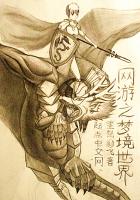It was in the last days of November, 1805. After the victory of Ulm, the Emperor Napoleon had established his headquarters in Brunn, where he seemed to wait for his adversaries to attack him. There was no longer one enemy opposed to him; he had no longer to cope with Austria alone, but also with Russia, whose emperor was now at Olmutz with the Emperor of Austria, for the purpose of agreeing with him on the plan of operations by which Napoleon was to be defeated. The Russian army had already formed a junction with the Austrian forces, and even the Russian life-guards, the elite of their army, had left Russia in order to accompany their emperor to the great decisive battle.
But Napoleon had likewise brought his guards along, and these splendid troops were impatient and eager to fight the last decisive battle with the Austrians and with "the hordes of the Russian barbarians."
Napoleon, however, still hesitated; his plans apparently had not been matured, and he seemed undecided whether to advance still further or to content himself with the victories he had already obtained.
This last alternative was urged on him by his generals, who believed the victory of Ulm to be so brilliant a triumph that the French army might repose on its laurels, instead of drawing the sword once more.
Napoleon, however, did not assent to these views of his generals.
"If we had to cope only with the Austrians we might be satisfied, but there are the Russians, too, and it will be necessary for us to send them home. We must give them their passports."
Greatly elated at this idea, the emperor ordered his horse to be brought to him.
"We will examine the country a little," he said to his generals;
"accompany me, gentlemen."
And surrounded by his brilliant staff, consisting of the most illustrious and victorious officers of his army, the emperor rode out far into the plain between Brunn and Vichau, crowned all around with hills and mountains. His bold, searching glances surveyed the country in every direction; not a height, not a tree, not a ravine, escaped his attention; he examined every thing, and seemed to engrave them on his soul. It was near nightfall when he returned with his generals from this long ride to his headquarters. He had all day been taciturn and absorbed, and none of his generals had been permitted to participate in his plans and observations. He had only sometimes directed their attention by a laconic word or by a wave of his hand to some peculiarity of the landscape, and the generals had received these words and gestures like the mysterious hints of an oracle, with the most respectful attention, in order to weigh them in their minds, and to indelibly engrave them in their memory. On his arrival at the door of his headquarters, the emperor turned his pale, grave face once more to the plain which they had just left.
"Gentlemen," he said, in a loud voice, "study that part of the country as closely as possible; you will have to play a role in it within a few days. General Suchet, on the left side of your division there is an isolated mound, commanding your entire front. Cause fourteen cannon to be placed on it in the course of the present night." [Footnote: Napoleon's own words. Vide "Memoires du Duc de Rovigo," vol. ii., p. 169.] He nodded to the gentlemen and entered his cabinet.
He paced his room for a long while with folded arms, compressed lips, and a gloomy air.
"I need a few days more," he muttered. "If they should attack me now, quickly and resolutely, I must succumb; if they give me three days' time, however, I shall defeat them."
When he then stooped musingly before his desk, he suddenly noticed the papers lying on it.
"Ah," he said, hastily seizing a large, sealed letter, "a courier, who has brought dispatches in my absence! From the minister of the navy--news from the fleet!"
He broke the seal hurriedly and unfolded the paper. While reading it his mien became still more gloomy; a cloud of anger settled on his expansive brow, and his cheeks, which had hitherto only been pale, turned livid.
The glance which he now cast toward heaven would have reminded the spectator of the Titans who dared to hurl their missiles even at the Sovereign Deity; the words muttered by his quivering lips were an angry oath.
With this oath he crumpled up the paper in his hand, threw it down and stamped on it; then, as if ashamed of his own violence, he sank down on a chair, and laid his hands slowly, and with a deep sigh, on his trembling, pale face. The modern Titan had now found out for the first time that there was a God enthroned in heaven more powerful than himself; for the first time an invisible hand had stopped him in his hitherto victorious course.
The paper he had just trampled under foot announced to him the first great defeat, the first check his grand schemes had met with.
The French fleet had been completely beaten and almost annihilated by the English at Trafalgar. [Footnote: October 21, 1806.] England, the only enemy who had constantly opposed Napoleon in a menacing and fearless manner, detested England had gained a magnificent triumph.
She had destroyed the whole naval power of France, and won a brilliant victory; a victory which humiliated France and overwhelmed her with disgrace. It is true it was a dearly-bought victory for England, for Nelson, her greatest naval hero, had paid for his immortal triumph with his life. The French admiral, Villeneuve, who was defeated at Trafalgar, had not even been lucky and wise enough to expiate his ignominy by his death; he had fallen, a despairing prisoner, into the hands of the English, and served as a living trophy to the triumphant conqueror's. [Footnote: Admiral Villeneuve was released by the English government. Napoleon banished him to Rennes, where he committed suicide on the 26th of April, 1806, by piercing his heart with a pin.]
Such were the terrible tidings which Napoleon had just received; it was the first thunderbolt which the God of heaven had hurled down upon the powerful Titan.














